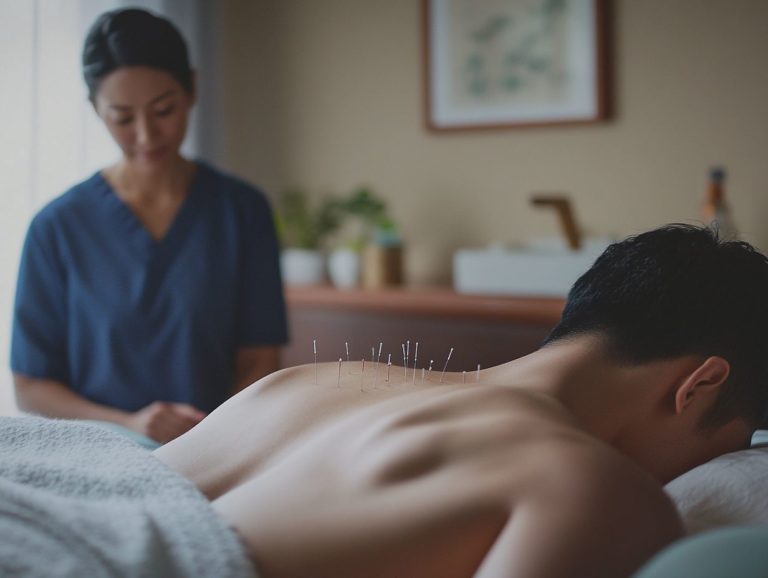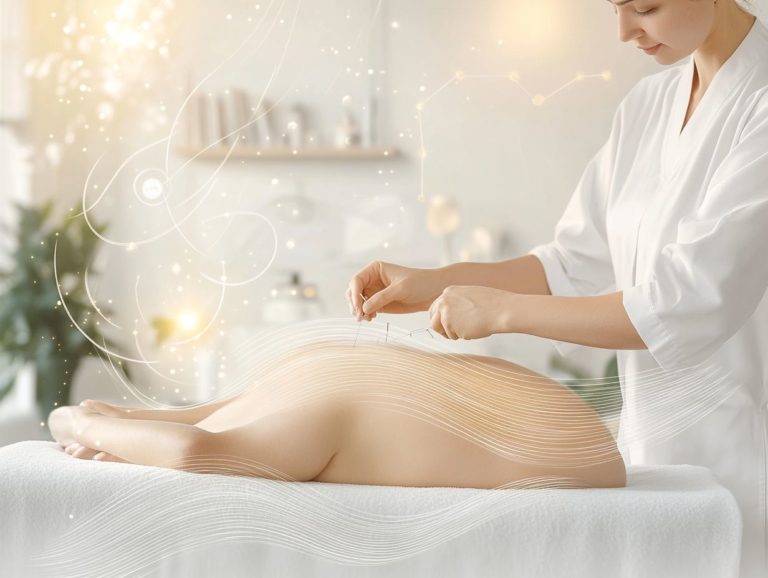5 Common Conditions Treated with Acupuncture
Acupuncture has emerged as a sought-after holistic approach to health, providing relief for an array of ailments. If you’re struggling with any of these conditions, now s the time to explore acupuncture s transformative potential.
This article delves into five prevalent conditions that acupuncture adeptly addresses: chronic pain, anxiety, insomnia, infertility, and migraines.
It also elucidates how acupuncture functions, its fundamental principles, and any potential side effects you might encounter. If you’re intrigued by the number of sessions you may require or the additional benefits this ancient practice can offer, continue reading to uncover the remarkable healing potential of acupuncture.
Contents
Key Takeaways:

Acupuncture is an effective treatment for chronic pain, anxiety, depression, insomnia, infertility, and migraines/headaches. It works by stimulating specific points on the body to restore balance and promote healing. Additionally, 5 ways acupuncture can help with stress relief highlight its positive effects on overall health and well-being.
1. Chronic Pain
Chronic pain doesn t have to control your life; acupuncture offers real relief! This condition impacts millions of individuals around the world, fundamentally diminishing their quality of life and often driving them to explore effective treatment options.
One such option is acupuncture, a cornerstone of traditional Chinese medicine that targets specific points to stimulate your body s natural healing processes.
This time-honored practice involves the precise insertion of fine needles into designated acupuncture points. It s believed to enhance your body s natural endorphin production while restoring the flow of life energy.
For those grappling with chronic conditions like arthritis, sciatica, or persistent muscle pain, acupuncture presents a promising pathway to relief. Numerous clinical studies have highlighted its effectiveness, showing marked reductions in pain and improvements in mobility for patients undergoing acupuncture treatments.
By addressing underlying imbalances, acupuncture not only alleviates symptoms but also gives you the power to help reclaim control over your health and overall well-being.
2. Anxiety and Depression
Acupuncture has emerged as a compelling alternative treatment for anxiety and depression, offering a holistic approach that harmonizes the body s energy flow and boosts endorphin levels. This safe, gentle treatment focuses on specific points along the body s meridians, effectively regulating life energy.
Numerous clinical studies underscore its effectiveness, revealing notable reductions in anxiety and depressive symptoms among those receiving acupuncture compared to control groups.
This therapy offers not only a natural remedy but also a viable alternative to pharmaceuticals, which often come with a laundry list of undesirable side effects. As mental health professionals delve deeper into integrative treatment options, the advantages of acupuncture in fostering emotional well-being are gaining well-deserved recognition.
3. Insomnia
Insomnia is a common sleep disorder that affects people of all ages. Acupuncture presents a natural route to relief by targeting the underlying imbalances in life energy while promoting deep relaxation.
This traditional Chinese medicine technique hones in on specific acupuncture points, including Shenmen (HT7) and Anmian, which are thought to soothe the mind and regulate sleep cycles.
Research has demonstrated that acupuncture can significantly improve sleep quality and diminish anxiety, ultimately fostering greater overall wellness. One noteworthy clinical study published in the Journal of Alternative and Complementary Medicine revealed that participants who received acupuncture experienced a notable reduction in insomnia symptoms compared to those undergoing conventional treatments.
By alleviating stress and rejuvenating the body s energy flow, acupuncture not only enhances your sleep but also contributes to a heightened sense of vitality and emotional balance.
Don t wait! Discover how acupuncture can enhance your health today.
4. Infertility

Acupuncture is a recognized ally in the journey to fertility. It supports couples facing infertility by fostering harmony in reproductive organs and enhancing overall health.
It stimulates specific points to boost blood flow, which brings nutrients and oxygen to reproductive organs, creating a nurturing environment for conception.
Moreover, acupuncture plays a crucial role in regulating hormonal balance by modulating the hormonal system, vital for reproductive function. Key points such as Spleen 6 and Ren 4 are frequently targeted to optimize ovarian function and balance hormone levels.
Acupuncture effectively reduces stress, a known factor that can negatively impact fertility, by promoting the release of endorphins.
Studies, including one in the Journal of Endocrinology, show a positive link between acupuncture and improved fertility outcomes.
5. Migraines and Headaches
Migraines and headaches can be debilitating for many people. Acupuncture naturally relieves pain by targeting specific points and enhancing endorphin release.
It eases discomfort and promotes long-term wellness by balancing your body s systems. By stimulating your nervous system, acupuncture significantly reduces chronic stress levels, a known trigger for headaches.
Regular acupuncture sessions can significantly reduce the frequency and intensity of migraines, improving overall quality of life for many participants.
This holistic approach can effectively serve as an alternative or complementary treatment for anyone grappling with persistent headache issues.
What Is Acupuncture and How Does It Work?
Acupuncture is a key part of traditional Chinese medicine that uses fine needles on specific points of your body. This technique promotes the flow of qi, the vital energy essential for your health and well-being.
Rooted in a profound understanding of the interconnectedness of your body and its energy dynamics, this practice dates back thousands of years. Practitioners believe that by stimulating these designated points, they can correct imbalances in energy flow and alleviate conditions such as pain, stress, and various ailments.
Meridians are pathways for qi that connect physical and emotional health. When your qi is obstructed or depleted, negative health consequences can arise.
Acupuncture not only addresses symptoms but also restores balance and harmony, enhancing overall well-being.
What Are the Key Principles of Acupuncture?
The key principles of acupuncture are based on qi, meridians, and your body s healing abilities. A free flow of qi is vital for your physical and emotional balance.
Acupuncturists recognize that any disruptions or blockages in this energy flow can lead to various health issues. Meridians are intricate pathways for this energy throughout your body.
By understanding the unique characteristics of each meridian and its connection to your bodily functions, practitioners can customize treatment plans that specifically target your ailments. Techniques like needle placement, moxibustion, and cupping harmonize energy flow, helping your body heal itself.
How Does Acupuncture Help with These Conditions?

Acupuncture is a remarkable tool for managing a variety of conditions, including chronic pain, anxiety, and depression. By stimulating specific acupuncture points, it enhances blood circulation, releases endorphins, and promotes both mental and physical well-being.
Research underscores that for chronic pain think back pain and osteoarthritis acupuncture can deliver substantial relief and improve functionality.
In a clinical study published in the Archives of Internal Medicine, participants who underwent acupuncture reported greater pain reduction compared to those receiving conventional treatments alone.
As an additional treatment, acupuncture works well with traditional methods like medications or physical therapy, helping you heal better while minimizing side effects. By incorporating acupuncture into your comprehensive treatment plan, you can embrace a holistic approach that addresses both physical symptoms and emotional health, leading to a more balanced and fulfilling life.
What Are the Possible Side Effects of Acupuncture?
While acupuncture is usually regarded as a safe practice, it’s important for you to be aware of potential side effects. You may experience minor soreness at the needle insertion sites or temporary fatigue following your treatment sessions.
Occasionally, some individuals report light bruising or dizziness, but these instances are quite rare. If you re considering acupuncture, it s essential to consult a qualified practitioner who can offer tailored advice and ensure your experience is safe.
By openly discussing any pre-existing health conditions or medications with your practitioner, you can effectively minimize any risks. Practitioners usually recommend that you stay well-hydrated and take some time to rest after your sessions.
This approach can enhance your overall acupuncture experience, allowing your body to fully process the treatment for the best possible results.
How Many Sessions of Acupuncture Are Needed for Treatment?
The number of acupuncture sessions you may need for effective treatment really depends on your specific condition, the severity of your symptoms, and your overall health status.
If you re dealing with chronic pain, you might find that it requires more sessions to achieve lasting relief.
Factors like your age, lifestyle, and any underlying health issues can significantly impact how long your treatment lasts. Practitioners will typically evaluate your progress through regular assessments, which include physical examinations and your feedback about symptom improvement.
Based on these evaluations, they can fine-tune your treatment plan adjusting the frequency of sessions, the specific acupuncture points targeted, and any complementary therapies. This personalized approach ensures that your treatment aligns perfectly with your evolving needs and health goals.
What Are Some Other Benefits of Acupuncture?
Along with addressing specific conditions, acupuncture presents a myriad of health benefits for you, such as boosting your immune system, improving energy flow, and enhancing your overall well-being. This makes it an invaluable part of your integrative health strategy.
Research suggests that regular acupuncture sessions can notably lower your stress levels, leading to improved mental clarity and emotional stability.
This technique has also been shown to assist in managing chronic pain, gradually encouraging a more active lifestyle.
For example, a study published in the Journal of Pain found that participants receiving acupuncture reported reduced pain and enhanced function, ultimately contributing to a higher quality of life.
By incorporating acupuncture into your routine, you may not only experience relief from current ailments but also adopt a proactive approach to maintaining your long-term health and wellness.
Frequently Asked Questions

Which conditions can acupuncture treat effectively?
The top five conditions treated with acupuncture are chronic pain, digestive issues, headaches and migraines, anxiety and depression, and infertility. If you’re curious about the practice, check out the 5 most common acupuncture questions answered.
Don t wait to start your journey to wellness! Book a session today and discover the amazing benefits of acupuncture.
How does acupuncture help with chronic pain?
Acupuncture can relieve chronic pain by stimulating the release of endorphins. These are natural painkillers produced by your body.
Can acupuncture help with digestive issues?
Yes, it effectively addresses digestive issues like stomach discomfort and acid reflux. Acupuncture regulates the digestive system and promotes relaxation.
Is acupuncture a good treatment for headaches and migraines?
Countless individuals experience relief from headaches and migraines through acupuncture. Targeting specific pressure points reduces the frequency and intensity of these pains.
Can acupuncture help with anxiety and depression?
Acupuncture can manage anxiety and depression symptoms by promoting relaxation and reducing stress. It also improves your mood and energy levels.
Is acupuncture a viable treatment for infertility?
Yes, acupuncture has been used for centuries to support fertility. It helps improve success rates for assisted reproductive technologies, like in vitro fertilization (IVF), where an egg is fertilized by sperm outside the body.






